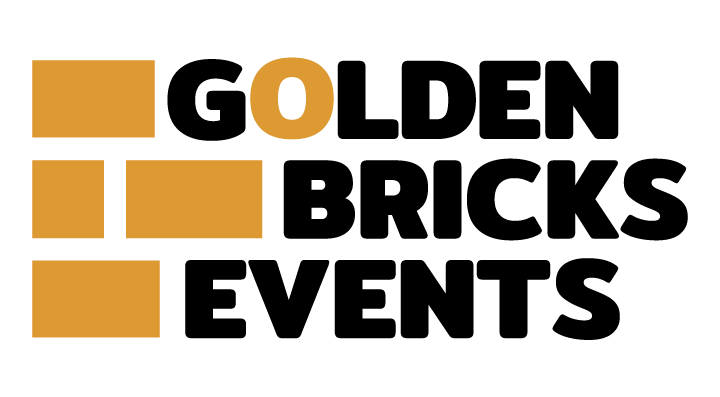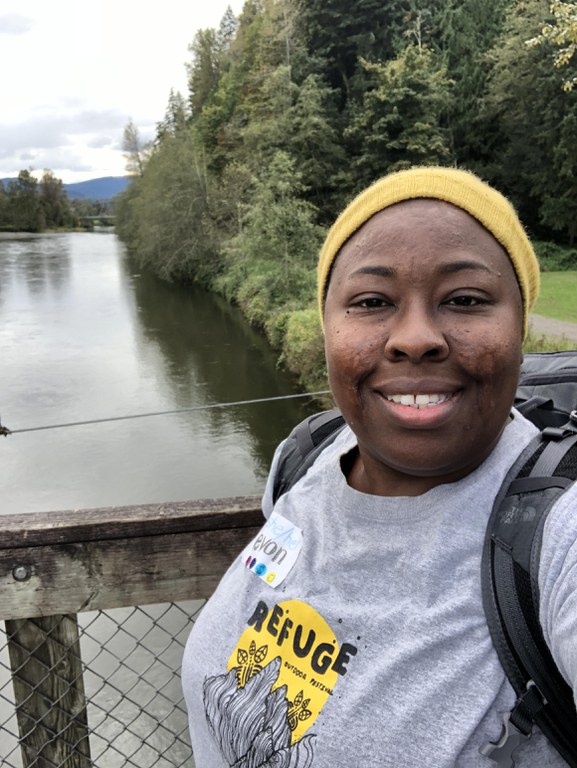How Chevon Powell built an event for people of color in the outdoors — and why that’s more important than ever right now.
By Crystal Gartner
On the way to her first solo backpacking trip in Vermont, Chevon Powell, a Black woman, was confronted by a White police officer, who followed her into her hotel’s parking lot and turned on his sirens. He questioned why she was in the area and called for backup.
“He said that it was unbelievable that I would be in Vermont to go backpacking, which is just a whole lot of levels of ridiculousness,” Chevon said.

Chevon wearing a Refuge shirt while at Tolt-MacDonald. Photo by Chevon Powell.
Chevon was finally released, and she did take her backpacking trip. But that harrowing incident stuck with her and became part of her motivation to shift the mission of her company, Golden Bricks Events.
“The outdoors hasn’t always been that welcoming for people of color, for Black folks,” Chevon said. “We know the national parks used to be segregated. We know that there are trees that hung people that are still in prominent American parks. After that incident in Vermont, I thought, I can use my skills to create something that makes the outdoors a more welcoming place for Black people.”
That day sparked Chevon’s idea to create events centered on people of color and, after the tragedy of losing several family members in the same year, Chevon knew she needed an event that would offer refuge. She named her event exactly that, Refuge, and planned it as a multi-day camping experience geared toward people of color, centered on building community through outdoor recreation, conversations, workshops, live music and art for a diverse and inclusive audience.
“When traumatic things happen to you like family loss, you are reminded that your time is limited,” Chevon said. “Nature is my place of refuge and healing. I knew that other people that looked like me probably needed that too, now more than ever.”
The first Refuge was in September of 2018, attended by 140 outdoor enthusiasts from all over Washington and the country. Even though Chevon endured the loss of 11 family members that year, she planned and launched the first Refuge Outdoor Festival in just 7 months.

Held at Tolt-MacDonald Park, in the Snoqualmie River Valley, the inaugural Refuge offered a wide menu of activities that met all levels of outdoor experience, including outdoor yoga, bikepacking, discussions on race and privilege, sharing of history of communities of color in the outdoors, and of course, outdoor cooking and live music.
Refuge was held again in 2019. Then this year, when the pandemic hit, followed by uprisings to protest police violence against Black people, Chevon pivoted to turn Refuge into an online camp-in, to protect communities and provide healing.
“For me there was this urgency to make sure that this still happened,” she said. “There are folks that just need a weekend reprieve from the stuff that happens in everyday regular society, which is what I always hope Refuge is,” Chevon said.
This year’s Refuge, which was in September, focused even more sharply on social justice. Folks from all over the country gathered online for a weekend of entertainment, activities and workshops including How Disability Justice Will Build Caring Communities, Exploring the Arctic National Wildlife Refuge, Backpacking Basics & Connecting with Nature During Covid, a DJ battle, affinity groups for White, Black and other people of color, and many other activities organized for joy and healing.

A group of Refuge attendees in 2018 head off on a morning bird watching session. Photo courtesy GBE.
“A lot of the narrative around the outdoors has been from a White male perspective,” Chevon said. “To know that there are other voices and other ways of being in the outdoors is powerful for BIPOC folks. All of our different ways of being in the outdoors are valid and important. Some Refuge participants only go outside in their neighborhood but want to know more about the outdoors. Some people are full backcountry experts. Refuge gives them that shared experience. There’s a lot of power in the knowledge sharing that happens in Refuge. It helps people feel comfortable to do these activities. There are a lot of workshops as well to empower people to care for themselves and for community, and that has a ripple effect.”
Chevon’s love of nature and the outdoors began in childhood. “I started really young by going to a camp for burn survivors,” she said. “I learned to fish and became a Girl Scout. That turned into a love of hiking, camping and backpacking. Just get me in a tent and I’m a happy girl.”
With a lifetime of outdoor experience, Chevon knows racism is still a problem on trail. “The looks I get, the comments like, ‘Oh I’m surprised to see you out here,’ the ranger coming to my campsite because I’m ‘too loud’ when I’m no louder than any of the other folks around who don’t get the same visit,” she said. “There’s this perception that someone who looks like me isn’t a part of the outdoors.”

Chevon (left) created Refuge in 2018 as a way for people to come together and find community and healing. Photo courtesy GBE.
Chevon hopes that Refuge and other efforts are changing who people expect to see in the outdoors and changing assumptions about their level of experience.
“For years I hesitated to say I was into the outdoors or into certain things in general because society has told me that if you are Black you can’t do those things. That’s why having a space like Refuge to share knowledge is important,” Chevon said. “Maybe someone else that was previously like me will be like, ‘OK, I am into this, this is something I do and it’s not a secret.’”
For Chevon, Refuge is an extension of her personal journey of growth and healing. “Not only just from the types of trauma that we all experience in life, but also the trauma of being a Black person in America, of being a burn survivor in America.”
After this year’s Refuge, Chevon received messages that it was indeed a needed respite from everything. She is excited to look ahead to having people connect in person at next year’s Refuge.

An artist at the 2018 Refuge Event. Photo courtesy GBE.
“I do want us to continue making this accessible to more people,” she said. “It’s likely to be a hybrid event, holding some activities online, because that is the only way some folks can access the outdoors.”
In the closing moments of Refuge, Chevon told participants, “Community is at the center of all of this. Don’t let Refuge be just this weekend. Let Refuge be the way that you show up in the world. Take those things that are awakening inside you and move into a moment of action. That may be ‘I need to move around my house more.’ or ‘I need to be out here at these marches.’ Do whatever it is that you need to do for you, so that we as a community, as a people, can come to a better place in the world.”
Watch Refuge online
Visit the resource page on the Refuge website for links to some of the presentations. Or, visit the GBE Outdoors channel on YouTube for the full Refuge playlist.
How to support Refuge
- Volunteer. Help is needed during the off season for a variety of tasks.
- Donate. You can help Refuge have the funds needed to organize activities and speakers.
- Share. If you have or know of resources that would help Refuge’s mission, connect with Refuge. For example, at last year’s festival, Refuge was able to provide tents and sleeping bags for 10 people who didn’t have gear. For more info or to help, email info@refugeoutdoorfestival.com.


